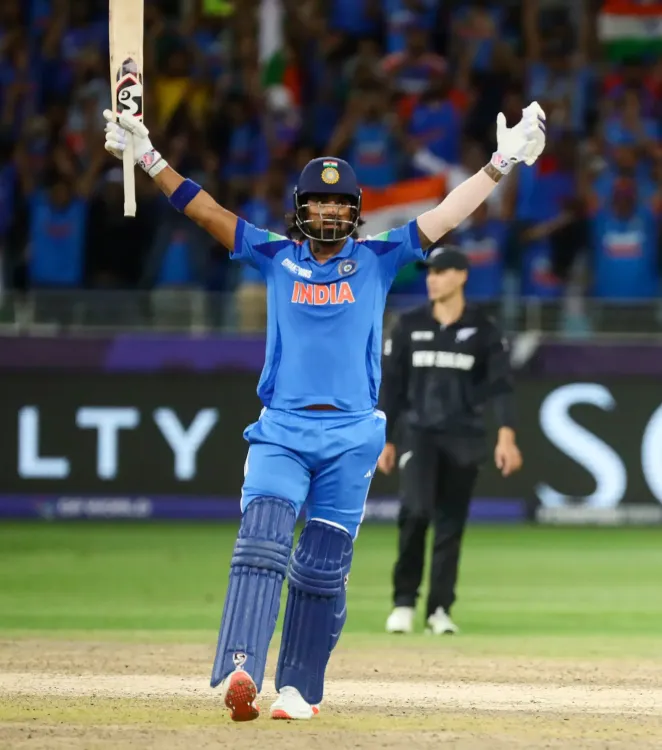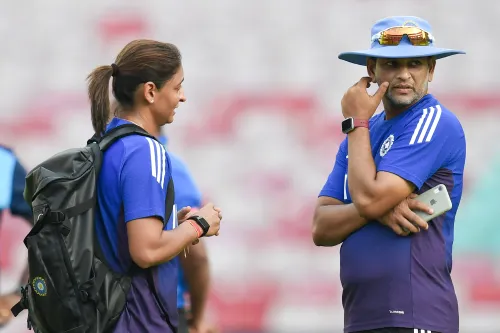KL Rahul Shines with Adaptability as a Finisher, Achieves Success in Champions Trophy

Synopsis
Key Takeaways
- KL Rahul's adaptability and calmness were crucial in the Champions Trophy.
- His unique batting style and strategic preparation helped India succeed.
- Rahul's ability to embrace new roles is reminiscent of his predecessor.
- His contributions in pressure situations were invaluable for the team.
- Coaching support played a significant role in Rahul's success.
New Delhi, March 12 (NationPress) Oscillatory motion is defined by the consistent back-and-forth movement of an object around a fixed point, much like a clock pendulum. In the quest to identify the most oscillatory player on the Indian cricket team, KL Rahul emerged as the clear choice.
When at his finest, Rahul's exquisite cover drives and seamless wrist flicks create a spectacle of elegance. However, navigating the fluctuating positions in his batting order has posed challenges, akin to the swinging motion of a pendulum.
His pivotal role in clinching India’s victory during the 2025 Champions Trophy showcases his ability to finish matches. Rahul embraced a new challenge by moving to the sixth position—the finisher's spot—after Axar Patel took over his usual number five position. Throughout the ODI series against England, questions arose about why Rahul was favored over Rishabh Pant.
Rahul's calm demeanor, humility, and proactive adaptability were critical to his success in the Champions Trophy. While his total of 136 runs in the tournament may seem modest, it belies his crucial contributions to India's lower middle order.
"He never voiced complaints about his batting order. Instead, he would inquire about areas for improvement and the reasons behind his batting style. Batting at the sixth or seventh position often means limited balls to face, as he has primarily opened the innings throughout his career," his childhood coach Samuel Jayaraj remarked.
"Adjusting his mindset to adapt to the situation was a fresh undertaking. He has undertaken various roles, yet this one demanded a different approach, which he embraced through diligent planning and preparation. His understanding of his role was evident in the final, where he successfully navigated singles against the left-arm spinners between point, cover, and extra cover."
"His strategy was well thought out, as he aimed to cross the line and secure victories for the nation. The only hiccup was a minor misunderstanding while running between wickets with Axar, but overall, he played superbly," Jayaraj added.
"It was like a symphony; he moved with grace while running and striking the ball. His patience and tranquility are undoubtedly gifts from above," Jayaraj continued.
Much like his renowned namesake from Bengaluru, who successfully filled diverse roles in the ODI format—including wicketkeeping—Rahul has demonstrated remarkable adaptability. "It's wonderful to witness a player seamlessly shift positions. The name Rahul seems destined to fit in any role, just as the senior Rahul did for the country, and now this emerging star is following suit," he noted.
"He relishes the opportunity; never did he express negativity—only enthusiasm. He would say, 'Sir, I enjoy it.' We never deliberated on where he would bat. He would simply mention, 'I need to be prepared and have a plan, counting the balls remaining,'" Jayaraj elaborated.
India's triumphs over Bangladesh, Australia, and New Zealand in the Champions Trophy were significantly facilitated by Rahul's adaptability and leadership in challenging situations. His crucial contributions of 41, 42 not out, and 34 not out on the slow Dubai pitches were invaluable in steering India to victory under pressure. Jayaraj emphasized that Rahul's success in those crucial chases was a result of his strategic foresight.
"When facing a left-arm spinner, you prepare specifically for that scenario. Against a leg-spinner, the preparation is tailored accordingly. In modern cricket, there's no time to waste; every second counts during practice," he explained.
"He has matured as a player. To me, he's not only intelligent but also a thoughtful cricketer. This made it easier for him to embrace the challenge, perform, and finish games. A crucial aspect was his focus on how to enhance his game."
"In comparison, players like Virat, Shubman Gill, and Rohit performed admirably but in different matches. Rahul did not bat against Pakistan, yet he consistently contributed runs in the remaining fixtures," he added.
"Against Australia, he exhibited patience, waiting for the right opportunities. While everyone claims to work hard, I believe he has worked both smarter and harder this time around," Jayaraj elaborated.
No discussion of Rahul's cricketing journey would be complete without mentioning India's defeat to Australia in the 2023 ODI World Cup final held in Ahmedabad. Rahul scored 66 in that match, noted as the slowest half-century for India during the tournament and faced significant backlash on social media.
In a YouTube conversation with Ravichandran Ashwin, he reflected on his indecision regarding when to attack Mitchell Starc. However, securing the Champions Trophy on March 9 provides a sense of solace for Rahul, a sentiment echoed by Jayaraj.
"After the World Cup final loss to Australia, he took it upon himself, stating he shouldn’t have gotten out at that moment and that it was a poor shot. Such moments can serve as awakenings, prompting reflection on how to improve. He now possesses a trophy for the country, a significant achievement. When you lose a wicket, you often find yourself reflecting on how to elevate your gameplay and take calculated singles, which he executed brilliantly in the final. It’s about how effectively he constructed his innings, maintaining composure even against Australia amid pressure," he concluded.
Jayaraj commended captain Rohit Sharma and the coaching staff for their unwavering support of Rahul in this new role. "The coaching staff's planning was exceptional—they devised a clear strategy. They sought someone to stabilize the innings and placed their trust in KL. They refrained from changing the order, even when there was an opportunity to promote KL, demonstrating confidence in their established plan," he explained.
"There was extensive dialogue and understanding between the senior players and coaches, fostering confidence among the team. The captain, coaches, management, and selectors believed in his capabilities, reinforcing a sense of purpose. I take immense pride in seeing him thrive in the lower middle order," he added.
While the cricketing community is currently captivated by Rahul's composed and adaptable batting in the Champions Trophy, Jayaraj noted that the tournament revealed the authentic Rahul—evoking memories of a disciplined and obedient young boy passionate about cricket.
"Many expressed admiration for Rahul's performance against Australia, and I concurred. I was out for lunch with my family when I heard someone mention, 'Rahul has to play.' My response was, 'He needs to perform.' Enjoying one's work is a key to success, and his happiness reflects in his performance," he stated.
"Throughout the Champions Trophy, I witnessed the real Rahul—the focus and elegance reminiscent of his youth. I have seen numerous matches from his early days, and it was a pleasure to observe. Even against Australia, he played exceptionally well, showcasing a more mature innings in the final," he remarked.
"To me, he is always blessed—a skilled cricketer and a wonderful human being who cherishes his sport. His humility and calmness are among his greatest traits, and I often remind him of this. I could see his joy in playing his role and the satisfaction he derived from his preparations. He truly deserves recognition for his dedication and ten years of exemplary cricket at the highest level," he concluded.









